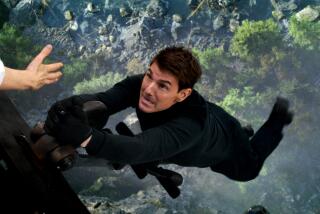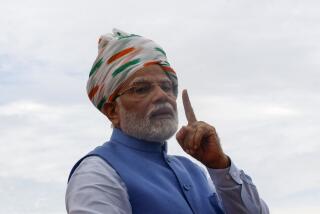STRIKE HALTS BBC NEWS WORLDWIDE
- Share via
LONDON — The British Broadcasting Corp. halted its news and current events programming Wednesday, at home and to a global audience estimated at 120 million people, for the first time in its 58 years.
The move came as part of a 24-hour strike by BBC news personnel protesting a decision by the corporation’s board of governors to withdraw “At the Edge of the Union,” a controversial documentary on Northern Ireland.
The decision, made under pressure from Prime Minister Margaret Thatcher and members of her Cabinet, has been widely interpreted as an unprecedented act of censorship against the BBC.
The BBC is owned and operated by the British government, but the absence of political interference since its inception in 1927 has helped it to earn a global reputation as one of the most independent and respected voices in broadcasting.
Britain’s Independent Television Network (ITN) also suspended news programming when its news personnel joined the BBC strike in sympathy.
British viewers tuning in for morning television news found only a short message on their screens: “We are sorry we are unable to bring you our scheduled programs.” Five-minute hourly radio newscasts were replaced by recorded music.
The BBC World Service suspended programming in all 37 languages for the first time ever. It transmitted only music, interrupted at 15-minute intervals with a brief statement that the staff was on strike to protest the withdrawal of the documentary.
The British public appeared to be divided on the issue of the canceled program, but many felt that they should have had a chance to see it. “It’s not up to Mrs. Thatcher to tell us what we should or should not see,” said London housewife Penelope Fishlock, “especially since the prime minister herself didn’t even see the program.”
Neither Thatcher nor Home Secretary Leon Brittan, who successfully sought the cancellation of the broadcast, had viewed the program before the controversy broke. They came out against its broadcast after receiving briefings about its content.
Many connected with the BBC have expressed concern that withdrawal of the program could cause irreparable harm to the BBC’s reputation for independence. The program deals with the strife between Roman Catholics and Protestants in Northern Ireland by focusing on two of the region’s most radical political figures.
The documentary, which was to have been shown Wednesday evening, was replaced by a taped Frank Sinatra concert.
On Wednesday afternoon, the corporation’s 12-member, government-appointed board of governors, which has the ultimate responsibility for the BBC and its content, joined with senior BBC management officials to confront the home secretary over the government’s role in the affair.
Thatcher and Brittan both objected to the documentary because one of the men featured in it, Martin McGuinness, is a leader of the Sinn Fein, the political wing of the Irish Republican Army, which among other things bombed a Brighton hotel last year where Thatcher and members of her Cabinet were staying to attend a party congress. McGuinness is also alleged to be a senior commander of the IRA itself, which he has denied. The IRA is outlawed in the United Kingdom.
The other major figure interviewed in the BBC documentary was Gregory Campbell, a hard-line Protestant leader who advocates a shoot-to-kill policy against IRA guerrillas.
Last month, in a speech to the American Bar Assn. following the hijacking of a TWA airliner, Thatcher urged journalists to “starve the terrorist and the hijacker of the oxygen of publicity on which they depend.”
BBC Chairman Stuart Young insists that the board’s decision to withdraw the program was not influenced by government pressure but was taken because the documentary was “basically flawed” journalistically.
The board of governors also claimed that the BBC producers of the documentary failed to adhere to carefully spelled-out procedures dealing with programs that require contact with terrorists or those associated with them. Those procedures require the approval of both regional and central BBC management before such programs can be aired.
Officials at BBC’S Northern Ireland branch, which produced the documentary, said that because McGuinness was an elected representative to the regional assembly, they felt such procedures were not necessary in this case.
Young has expressed displeasure that statements by Cabinet ministers have given the impression that the corporation gave in to pressure.
“We had a straight talk with the home secretary,” Young told reporters after a 2 1/2-hour meeting with Brittan.
In a statement issued after the meeting, Brittan reaffirmed his commitment to the BBC’s independence and expressed abhorrence of censorship, but said he had a right to make his own views known.
Only once before in BBC history has the board of governors ever demanded to see a program before it was put on the air. That instance, in the 1960s, involved a profile of former Prime Minister Harold Wilson that the board eventually withdrew.
Thatcher last clashed with the BBC over its reporting of the 1982 Falklands War with Argentina. She questioned the BBC’s patriotism because of its efforts to cover both sides.
Largely because of its Falklands War coverage, the BBC now has more listeners in Argentina than anywhere else in Latin America, a corporation spokesman said Wednesday.
Radio stations in Communist Bloc countries, in reporting Wednesday’s incident, described it as the destruction of the myth of the BBC’s independence.
More to Read
Sign up for Essential California
The most important California stories and recommendations in your inbox every morning.
You may occasionally receive promotional content from the Los Angeles Times.










